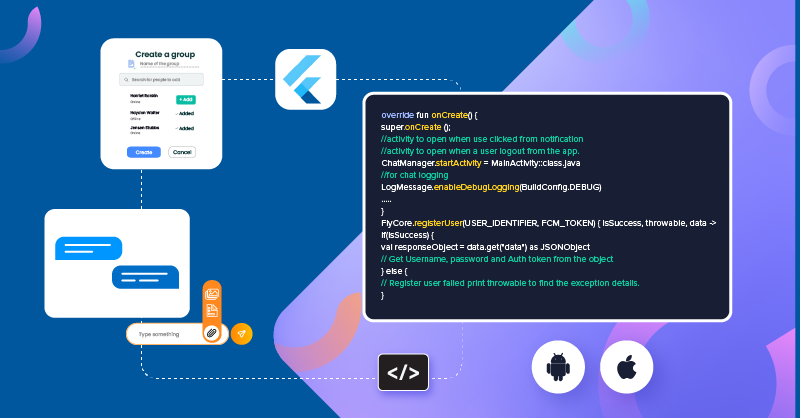MirrorFly’s Flutter SDK: The Better Way To Implement Chat On Apps

As an accountable in-app communication provider, we understand the heavy lifting that software development teams go through in creating full-fledged chat experiences on apps – and it sure is a time-consuming process.
Bearing in mind these technical and market priorities, we at MirrorFly have recently launched Flutter In App Messaging SDK with extensive support for powerful chat deployments.
The all-new update engineered by our developers is aimed at quickening the implementation of native chat applications on Android & iOS with a single codebase by virtue of Flutter’s innate capabilities – faster TAT & delivery.
Here’s presenting a comprehensive summary of our recent enhancement and how it streamlines chat integrations for developers at scale.
Table of Contents
Flutter: The Power Of “Open-source”
Flutter is the on-demand cross-platform framework developed by Google to fuel development of native-like applications on Android & iOS.
Built upon the foundations of Dart, the powerful open-source framework makes it extremely easy to build feature-rich experiences on apps in the shortest time possible with the help of its
- Layered architectural design
- Single code base
- Feature-rich widget library
- Hot reload
- Native-like performance
stands out distinctively in this fierce competition of hybrid app development.
The good news here is that, the framework in addition to the above capabilities, also supports code reusability enabling the use and adoption of built-in codes with bare minimum modifications across diverse native platforms.
Having understood the key distinctions of this framework, we’ve purposefully rolled out Flutter SDK to accelerate time to market and ship chat on multiple platforms in one go.
Let’s now dive deeper into the key benefits that make Flutter an ideal choice for app developers, specifically in-app chat.
Perks Of Utilizing Flutter Chat SDK
As Flutter continues to gather momentum in the realm of cross-platform development, here’s a look at the key factors behind the popularity and adoption of this budding framework:
- Faster development Regardless of the intent of the app, the framework, with its hot reload functionality, quickens development and time to market.
- Great UX: One of the major factors that takes the most time in cross-platform development is UX. By virtue of its full-fledged widget library, Flutter streamlines integration of UI elements into any app at ease
- Hot reload: By enabling developers to visualize code changes in real-time without delays, the hot reload feature accelerates development in no time
- Simplified processes: The technology simplifies app building with its layered architecture and aids in the integration of features without any overlay
- Saves time and resources: Powered by a single codebase, the framework in itself supports development of native apps via code sharing mechanism, thereby saving a huge amount on time and resources
- User-friendliness: All in all, the convenience of experimentation, bug fixing, and UI-friendliness makes Flutter the ideal aid for app development.
Cross-platform app development with Flutter Chat : Break down
Given the diverse array of possibilities, Flutter is by far the coveted framework for building cross-platform apps conveniently.
Besides, the lightweight tech is adeptly suitable for the following major use cases:
- Building an MVP in a swift manner
- UI-rich interface is a priority
- Demand for higher performance
- Apps intended to scale globally
And precisely, that is what we have tried to accomplish with our recent release!
Presenting MirrorFly’s Flutter Chat SDK
Powered on the foundations of a resilient chat infrastructure, MirrorFly’s all-new Flutter SDK supports the development of real-time messaging experiences on any app – Android/iOS in a whim.
Engineered with an array of 150+ features, robust integration, end-to-end encryption standards, compelling UIKits and documentation, the SDK facilitates seamless integration of chat across all business use cases such as enterprise, social communities, ecommerce, business, elearning, healthcare etc.
The built-in integration expertise of the SDK allows developers to incorporate the following features onto any app in a matter of minutes:
- Single/group chat
- Forward messages
- Message attachment
- Group creation
- File & media sharing & much more
With an established 99.999% SLA and the power to scale upto 1B+ conversations, this recent enhancement is aimed at creating niche communication experiences, empowering developer-friendly implementations across tech stacks.
Recommended Reading
Get started with Flutter In App Messaging SDK
Well, it is quite clear that Flutter forward is the obvious future for building encrypted Flutter cross-platform chat apps.
And to make things easy for the developer fraternity, here’s presenting a comprehensive integration roadmap that might come handy.
Pre-requisites
- SDK License
- Android studio
- Xcode
- Flutter
- Dart
Get the ball rolling by
- Integrating native dependencies
Android project level build.gradle
allprojects {
repositories {
maven {url "https://repo.mirrorfly.com/snapshot"}
}
}
----------------------------------------------------------
Android app level build.gradle
dependencies {
implementation 'com.mirrorfly.sdk:appbase:0.0.10'
}
iOS in POD file
pod 'Mirrorfly-ios-framework', :git => 'https://github.com/MirrorFly/Mirrorfly-ios-framework.git', :branch => 'pod_qa'
post_install do |installer|
installer.pods_project.targets.each do |target|
flutter_additional_ios_build_settings(target)
target.build_configurations.each do |config|
config.build_settings['IPHONEOS_DEPLOYMENT_TARGET'] = '12.1'
config.build_settings['ENABLE_BITCODE'] = 'NO'
config.build_settings['APPLICATION_EXTENSION_API_ONLY'] = 'No'
config.build_settings['BUILD_LIBRARY_FOR_DISTRIBUTION'] = 'YES'
config.build_settings["EXCLUDED_ARCHS[sdk=iphonesimulator*]"] = "arm64"
# flutter_additional_ios_build_settings(target)
config.build_settings['GCC_PREPROCESSOR_DEFINITIONS'] ||= [
'$(inherited)',
## dart: PermissionGroup.contacts
'PERMISSION_CONTACTS=1',
'PERMISSION_LOCATION=1',
'PERMISSION_PHOTOS=1',
#'PERMISSION_MICROPHONE=1',
'PERMISSION_CAMERA=1',
## dart: PermissionGroup.mediaLibrary
'PERMISSION_MEDIA_LIBRARY=1',
]
end
end
- Integrate Flutter dependency
- Include the FlySDK package in your Flutter project in order to make the most of MirrorFly API’s.
- Create a packages folder in your root directory.
- Add the below dependencies in “pubspec.yaml”.
- flysdk: path: packages/flysdk
- You can use all classes and methods just with the following import statement
- import ‘package:flysdk/flysdk.dart’;
Technically speaking, it can never be any more easier.
Flutter Forward:
Driven by thoughtfully-curated measures, our recent release of Flutter Plugin for In App chat SDK makes it all the better for developers to build niche conversational features across platforms on the move.
Furthermore, given the plan to accommodate more feature-rich capabilities in the pipeline, we’re looking forward to continually expanding our catalog of offerings in a way that benefits the development and business ecosystem dealing with in-app communication deployments of the future.